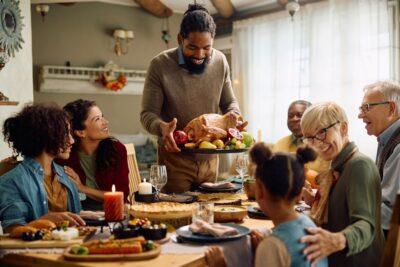
All through the Bible, there are three crucial food-centered festivals that God requested His folks to have fun annually. These gatherings weren’t simply summary or remoted occasions. They had been a time for households and communities to return collectively to thank God for His provision and to recollect the outstanding moments of their redemptive historical past. Every competition had distinctive customs, particular meals, and worship traditions, all serving to to inform Israel’s story. Let’s take a fast have a look at every “meals competition” and why they held such which means.
The Pageant of Unleavened Bread (Passover)
This competition, additionally known as Passover or the Feast of Unleavened Bread, befell within the month of Abib (now often called April). It commemorated Israel’s escape from slavery in Egypt… a pivotal occasion the place God’s energy was displayed in delivering His folks.
For seven days, everybody ate unleavened bread, a flat, yeast-free bread that represented their fast departure from Egypt.
This bread reminded them of the haste with which they needed to depart with out time for his or her dough to rise. Consuming unleavened bread introduced again recollections of God’s nice rescue annually. Throughout this competition, nobody arrived empty-handed; folks introduced choices from their crops, exhibiting gratitude for God’s blessings.
The Pageant of Harvest (First Fruits)
The second competition, the Pageant of Harvest or Pageant of First Fruits, celebrated the primary crops of the season, particularly grains like wheat and barley. Farmers introduced the primary grains they harvested to say “thanks” to God for the harvest and to indicate their belief that He would proceed to supply sooner or later. Also called the Feast of Weeks, it befell seven weeks after Passover. In Christian custom, this competition aligns with Pentecost, when the Holy Spirit got here to Jesus’s followers.
The Pageant of Ingathering (Tabernacles)
The third competition, the Pageant of Ingathering, additionally known as the Feast of Tabernacles or Feast of Cubicles, befell within the fall after the 12 months’s last harvest. It was a time to provide thanks for your complete 12 months’s abundance. Throughout this competition, God’s folks constructed momentary shelters, known as cubicles, to remind them of how He supplied for them throughout their 40-year journey by way of the wilderness earlier than they entered the Promised Land. Residing in these makeshift huts dropped at thoughts God’s faithfulness and His fixed provision.
New Which means in Christian Custom
Within the New Testomony, the Apostle Paul explains that Christians don’t have to have fun these festivals precisely as Israel did within the Outdated Testomony however quite to see them as pointing to Jesus. Passover, as an example, is linked to Jesus’s sacrificial demise for humanity’s sins, a connection Christians honor in Communion or the Lord’s Supper. The festivals are nonetheless about gratitude and pleasure, reminding believers of all God has finished.
The Sabbath and Weekly Gatherings
Sundays had been additionally handled like weekly mini-festivals, a time for relaxation, worship and gathering with household. It was frequent for households to have giant Sunday meals after church, celebrating God’s goodness. Though a few of these customs have light to a point, Sunday stays a day for a lot of to relaxation in God’s Windfall and togetherness, protecting the spirit of those historical festivals alive.

Thanksgiving: A Trendy Celebration Reflecting Historical Traditions of Gratitude and Blessings.
The Position of Meals in Our Religion
Meals performed a central position in all of the beforehand talked about festivals. Meals was greater than merely sustenance; it symbolized our dependence on God for all issues. In historical instances, harvest was unsure and sometimes depending on favorable climate. Dangerous circumstances might result in crop failures and even famine. Celebrating with meals reminded of us of their want for God’s care and provision.
One distinctive regulation throughout these celebrations was to not prepare dinner a younger goat in its mom’s milk. Some neighboring Canaanite religions did this as they practiced a type of magic as a part of their fertility rituals. Following God’s regulation, the Israelites confirmed they trusted in Him alone, with out resorting to occult superstition.
From the Center Ages to As we speak
Within the Christian Center Ages, folks didn’t sometimes have fun birthdays or state army victories as official holidays. Society didn’t view the state because the central authority in each day life. Nowadays, nevertheless, the federal government has a bigger position, usually designating “official” holidays on the calendar, extra like historical Rome. Whereas holidays like Christmas and Thanksgiving nonetheless maintain non secular significance for a lot of, the state’s position in setting official authorities holidays reveals a shift in our cultural values.
As we speak, we have now celebrations like Thanksgiving, which echoes the harvest festivals of historical instances, giving thanks for God’s blessings. Communion is a contemporary reflection of Passover, reminding Christians of Jesus’s sacrifice. Over time, holidays like Christmas and Easter have develop into Christian Holy Days celebrating Jesus’s start and resurrection.
These historical festivals had been about honoring God, having fun with His blessings, and remembering the methods He offers. They proceed to remind us of the significance of gratitude and belief in God’s provision for meals, household, and life itself.



